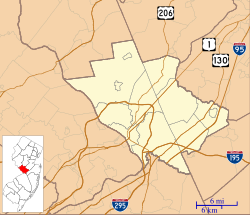Penns Neck is an unincorporated community located within West Windsor Township in Mercer County, in the U.S. state of New Jersey.[2][3] The community developed at the intersection of the Trenton-New Brunswick Turnpike (now U.S. Route 1) and Washington Road.[4][5] The Penns Neck Circle and the historic Penns Neck Baptist Church (1812) are both located in Penns Neck. The Princeton Branch rail line, known as the Dinky, has run through the area since 1865, and stopped at Penns Neck station until January 1971.[6]
Penns Neck, New Jersey | |
|---|---|
 The historic Penns Neck Baptist Church. | |
| Coordinates: 40°19′56″N 74°38′13″W / 40.33222°N 74.63694°W | |
| Country | |
| State | |
| County | Mercer |
| Township | West Windsor |
| Elevation | 98 ft (30 m) |
| GNIS feature ID | 879214[1] |
History edit
The 6500-acre tract of land that would become Penns Neck was initially purchased from the East Jersey Board of Proprietors by William Penn, Quaker founder of Pennsylvania. In 1737, concurrent to the settlement of Dutch Neck, Garret Schenck 7 John Covenhoven purchased the land from Penn's sons. That same year is the first year that the name "Penns Neck" (named after Penn) appears - alongside an alternate name, "Williamsborough." Soon after, the area - bordered by the Stony Brook to the west, the Millstone River to the north, the Assunpink Creek to the south, and Penn Lyle Road to the east - became settled by the Schenck and Covenhoven families.[7]
In the late 1730s/1740s, the Schenck-Covenhoven cemetery was constructed to house the settlers' dead. Following the chartering of Brunswick Pike (Route 1) in 1804 and its completion in 1807, the community began to flourish, seeing the construction of the Red Lion Inn. In 1812, the Princeton Baptist Church (AKA the Penns Neck Baptist Church) was erected, helping to center the intersection of Route 1 and Washington Road as the geographical and historical heart of the community.[7]
In October 2019, the Historical Society of West Windsor published an online museum exploring the history of West Windsor - including Penns Neck.[7]
References edit
- ^ a b "Penns Neck". Geographic Names Information System. United States Geological Survey, United States Department of the Interior.
- ^ Locality Search, State of New Jersey. Accessed January 9, 2015.
- ^ Penns Neck Area, Route 1 Section 2S and 3J, West Windsor and Plainsboro Townships, Mercer and Middlesex Counties: Environmental Impact Statement, Volume 2 (Report). Federal Highway Administration. 2004. Retrieved September 27, 2017.
- ^ History, West Windsor Township, New Jersey. Accessed October 6, 2016. "Today, West Windsor can still identify the six farming villages that were a part of the area:... Penns Neck – on either side of Washington Road east of Route One"
- ^ Google (January 25, 2015). "Penns Neck, New Jersey" (Map). Google Maps. Google. Retrieved January 25, 2015.
- ^ Baer, Christopher T. "A General Chronology of the Pennsylvania Railroad Company, its Predecessors and Successors and its Historical Context: 1971", April 2015 edition. Accessed October 6, 2016. "Jan. 30, 1971 Last day of passenger service at Penns Neck station on Princeton Branch."
- ^ a b c "Penns Neck". THE SCHENCK FARMSTEAD. Retrieved September 29, 2020.
External links edit
- Media related to Penns Neck, New Jersey at Wikimedia Commons
- West Windsor History Museum - Penns Neck


